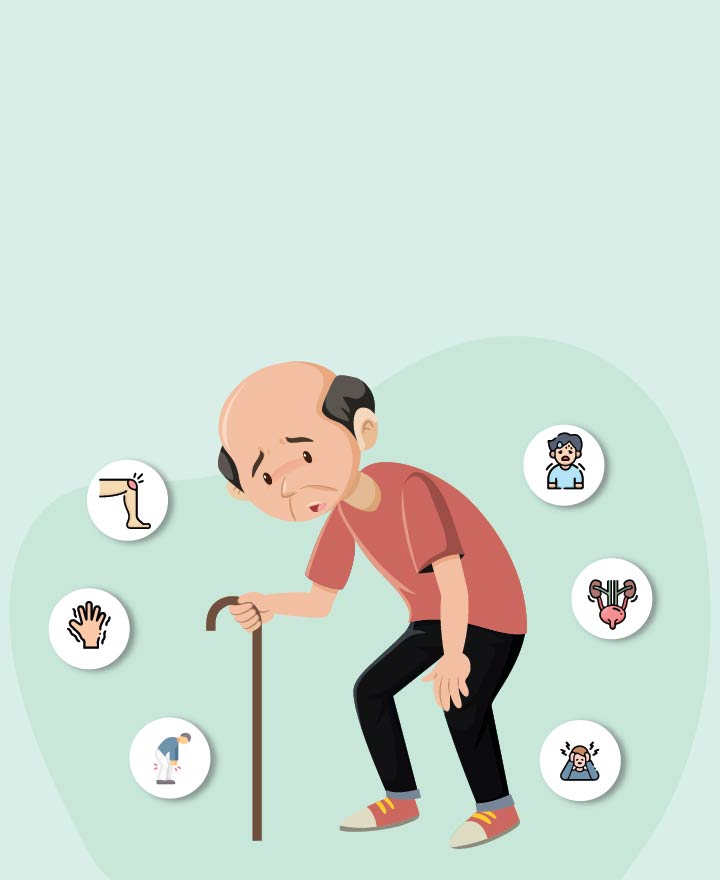

What are the Symptoms of Guillain-Barre Syndrome, and How to Prevent It?
Have you ever heard about the Guillain-Barré syndrome (GBS)? Well, most people haven’t. It is a rare condition, with a global overall incidence of 1–2 cases per 100,000 people per year. What makes it worse is that there is no known cure for this. Even the condition’s exact cause remains unknown. However, the focus should remain not on Guillain-Barré syndrome’s treatment but on its prevention. Read on to learn more about this disease, its symptoms that can help in early detection, and ways to minimise the risk.
Symptoms of GBS
Guillain-Barre syndrome is a rare neurological disorder in which our body’s immune system attacks the peripheral nervous system. Symptoms start with tingling sensations or muscle weakness in the legs and can spread to the face and arms.
The signs and symptoms of Guillain Barre syndrome include:
• ``Pins and needles’’ sensation in toes, fingers, wrists, or ankles
• Muscle weakness that starts in the legs and spreads upwards to the face and arms
• Difficulty with speaking, chewing, or swallowing
• Walking gets unsteady
• Severe pain in the back, shoulder, or legs
• Double vision
• Climbing stairs becomes difficult
• Trouble moving eyes
• Rapid heart rate and fluctuations in blood pressure
• Controlling your bladder or bowels becomes difficult
• Weakness in chest muscles, which can make breathing difficult
Symptoms typically last a few weeks. However, if they get worse, you must seek immediate medical attention. In severe cases, GBS can lead to paralysis of the legs, arms, or facial muscles.
Causes of GBS
What causes GBS is still not known. It is believed to be linked to infections, surgeries, or illnesses that trigger an autoimmune response. Some common causes of GBS include –
• Viral infections due to influenza, Zika virus, or Epstein-Barr Virus (EBV)
• Bacterial infections such as Campylobacter jejuni, which causes food poisoning. This infection usually results from undercooked poultry.
• Certain vaccinations like COVID-19 or flu can trigger GBS. This is rare, though.
• Surgery or trauma
• Other medical conditions like lymphoma can cause the syndrome
Diagnosis of GBS
The following tests are conducted to confirm GBS –
1. Physical examination: The doctor will assess your symptoms, muscle strength, and reflexes.
2. Medical history: If you have had any recent illnesses or infections, how and when the symptoms started?
3. Nerve Conduction Study (NCS): This test will measure the speed of nerve signals. If there is nerve damage, the signals will be blocked.
4. Electromyography (EMG): To evaluate the electrical activity in the muscles, which will help differentiate between nerve-related and muscle-related weakness.
5. Lumbar Puncture: In this procedure, a needle is inserted into the lower spinal cord to collect cerebrospinal fluid. The fluid is then sent for testing, and if the protein levels are elevated, it indicates GBS.
6. Blood tests: To rule out other conditions and infections.
How To Prevent GBS?
GBS cannot be prevented. However, certain precautionary measures can help reduce the risk of developing this autoimmune disorder. Let’s take a look at these –
• Practicing hand hygiene such as washing your hands frequently with soap and water, especially before eating and after using the restroom.
• Ensure foods like meat and poultry are cooked properly to reduce the risk of foodborne diseases.
• Drink boiled or purified water.
• Avoid consuming raw or undercooked foods such as eggs, seafood, or salads.
• Wash fruits and vegetables thoroughly before consuming.
• Maintain a strong immunity by eating a balanced diet (fruits, vegetables, lean proteins, and whole grains), regularly exercising, getting adequate sleep, refraining from smoking and alcohol, and managing stress with meditation, yoga, or relaxation techniques.
• Consult a doctor if you experience symptoms of infections such as respiratory difficulty, diarrhoea, or fever. Early intervention can help prevent complications.
Conclusion
People of all ages can be affected by GBS, though it is more common in adults, especially males. Looking at the rise in GBS cases in Maharashtra, awareness is key to identifying the symptoms and deciding on how to prevent Guillain-Barre syndrome. If you notice any indications of the condition, it is important to seek timely medical care and treatment. This will help you recover faster without any complications. If not promptly diagnosed and treated, GBS can be life-threatening. If you have comprehensive health insurance, check with your insurer if the policy provides coverage for GBS treatments.
One of the important components of our overall wellness is also being financially secured. Healthcare emergencies can happen any time, but a good health insurance policy can protect you from such uncertain situations. To know more about Wellness and other health related tips, visit the wellness corner.
Source: ndtv, timesofindia, hopkinsmedicine, who.int
Disclaimer: This blog provides general information and discussions about health and related subjects. The information and other content provided in this blog, website or any linked materials are not intended and should not be considered or used as a substitute for medical advice, diagnosis, or treatment. Kindly contact your doctor before starting a new medicine or health regime.
Related Articles
Muscle Atrophy - Causes, Symptoms, and Diagnosis
Meningitis - Symptoms, Causes & Treatment
How Hormones Influence Muscle Growth and Recovery
Muscular Dystrophy - Causes, Symptoms, and Treatment
Muscle Fatigue - Causes, Symptoms, and Treatment
Published on February 04, 2025


 Health Insurance
Health Insurance  Travel Insurance
Travel Insurance  Car Insurance
Car Insurance  Cyber Insurance
Cyber Insurance  Critical Illness Insurance
Critical Illness Insurance
 Pet Insurance
Pet Insurance
 Bike/Two Wheeler Insurance
Bike/Two Wheeler Insurance  Home Insurance
Home Insurance  Third Party Vehicle Ins.
Third Party Vehicle Ins.  Tractor Insurance
Tractor Insurance  Goods Carrying Vehicle Ins.
Goods Carrying Vehicle Ins.  Passenger Carrying Vehicle Ins.
Passenger Carrying Vehicle Ins.  Compulsory Personal Accident Insurance
Compulsory Personal Accident Insurance  Travel Insurance
Travel Insurance  Rural
Rural